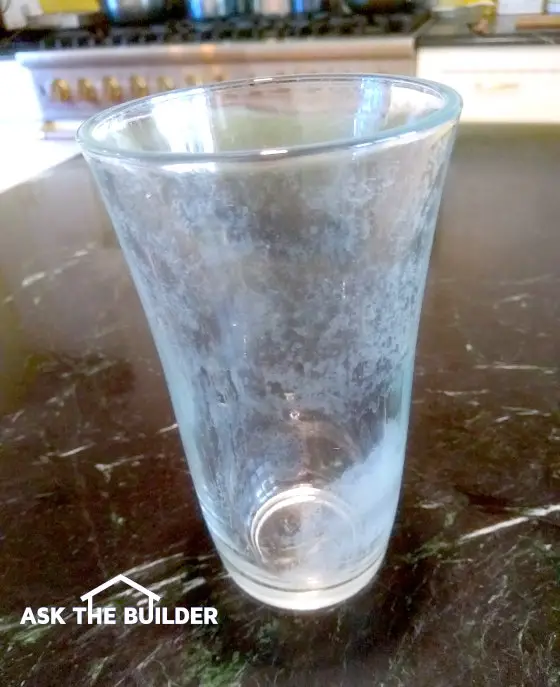
What Causes Etched Glasses | This drinking glass of mine used to be crystal clear. A name brand dishwashing gel helped ruin it. Copyright 2020 Tim Carter
What Causes Etched Glasses - It's Chelants
QUESTION: Tim, please help me. I remember reading in past columns that you’re a master plumber and have some sort of science degree. My husband and I are at odds as to what’s slowly ruining all of my wonderful clear glasses and heat-treated glass items in my kitchen. Each time I remove them from my dishwasher, they look worse. My husband states it’s just hard water. I tried soaking some of the ruined things in hot white vinegar and there was no change. It’s got to be something else, but I can’t figure it out. Can you shed light on this? Sandra P., Las Vegas, NV
Are you suffering like Sandra? I am! The clear drinking glasses in my own home are slowly getting ruined just as Sandra described. Sandra’s correct that I’ve got lots of experience with dishwashers being a master plumber since age 29 and having worked in a commercial kitchen operating a powerful chili parlor dishwasher for over 12 years. A five-hour physical chemistry class was a requirement for my geology degree.
Is the Cause Hard Water?
Many years ago, I was first introduced to this strange conundrum by my mother-in-law. I was a brash young man and she showed me one of her ruined small drinking glasses. She asked me if I knew what was going on. “Sure, it’s just hard water deposits. Let me take it home and restore it.” I tried soaking it in white vinegar, a mild acid that has no trouble dissolving hard-water mineral deposits. There was no change. I then got out my toxic bottle of muriatic acid and tried it full strength. There was no change. I was flummoxed.
As time passed, I deduced the issue had to be with the actual dishwashing detergents - be they powders, gels, or pods. In all my years of washing glasses by hand, they never suffered from etching, so whatever was happening was happening inside the steel box with the thrashing water spray.
Automatic Dishwashing Soap Etches Glass
Last month I finally had it. I reached out to what I believe is the largest USA manufacturer of automatic dishwashing soap, Procter & Gamble (P&G). They make the Cascade product I use. Since I’m a member of the working media, they were kind enough to accommodate my press inquiry.
A senior scientist from P&G explained that a perfect glass-etching storm can happen inside a dishwasher if you have these four things: soft water, low soil load, high temperatures, and chelating agents. She went on to say, “Chelating agents, or chelants, are a major part of auto-dishwashing formulations because they form soluble complexes with calcium and other metal ions, enabling them to remove food soils and limescale, soften water, and boost hygienic cleaning action.” When you soften water as I do at my home, you remove the calcium from the water. Uh oh!
To prevent glass etching, she suggested not rinsing dishes and glasses, wash in shorter cycles, not using the pots-and-pans or sanitizing settings, and using a dishwashing product that contains zinc.
The bottom line, in my opinion, is that if you want your clear glass to remain clear, you better do what I had to do as a kid. Wash them all by hand with normal liquid dishwashing soap. Your other option is to just keep buying new glasses after they get etched should you not want to wash them by hand.
Column 1371
The post What Causes Etched Glasses in Dishwashers appeared first on Ask the Builder.
Via Home http://www.rssmix.com/
No comments:
Post a Comment